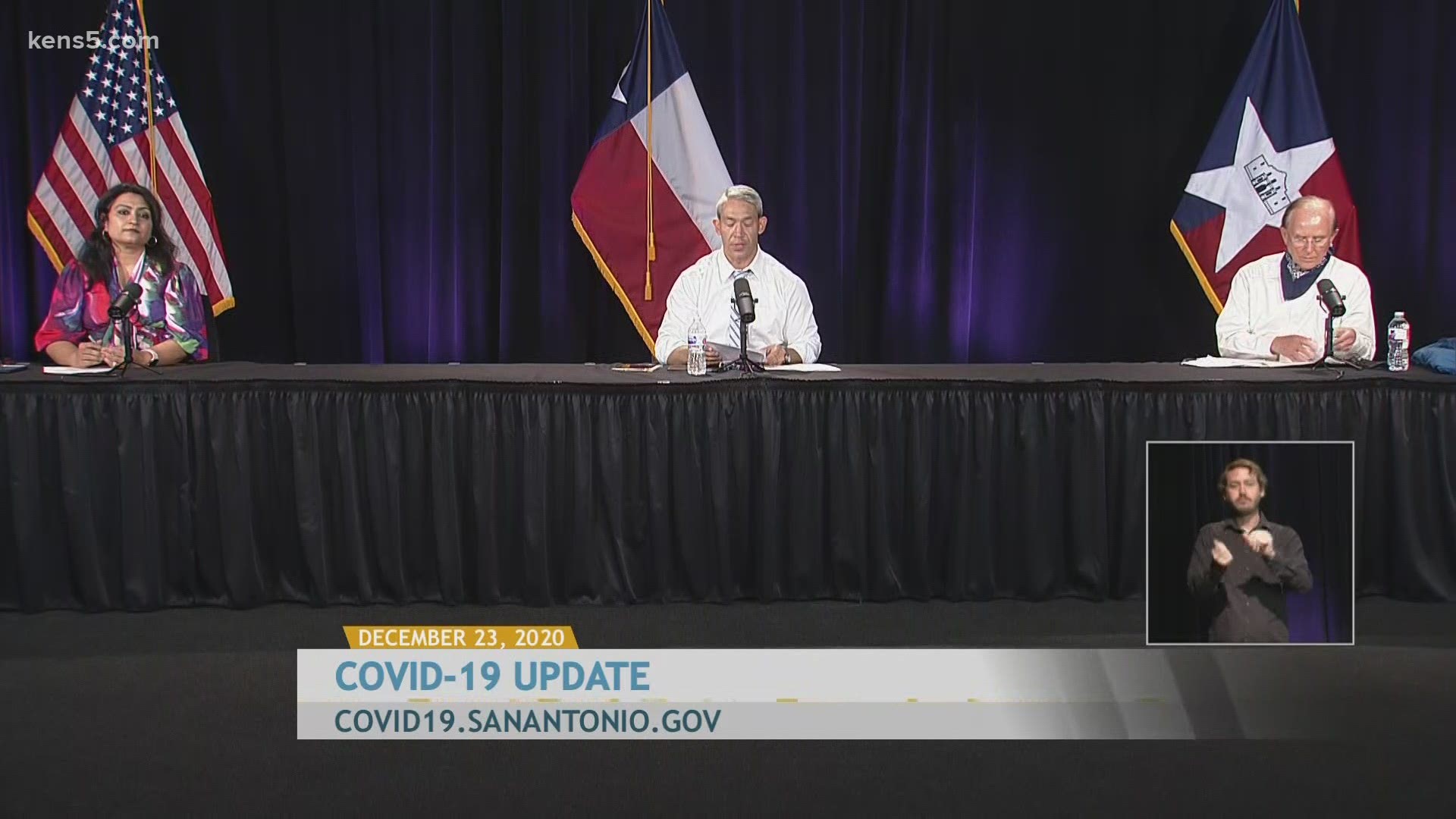SAN ANTONIO — We're tracking the latest numbers from the coronavirus pandemic in San Antonio and across Texas. Here are the latest numbers reported by Bexar and surrounding counties:
- Bexar County: 1,629 new cases were reported on Wednesday, bringing the total number of cases to 106,793. Eight new deaths were also reported, raising the death toll from coronavirus complications to 1,479.
- Hays County: Officials in Hays County on Tuesday reported 165 new cases in the county and two additional COVID-related fatalities. As of Tuesday, there are a total of 9,175 lab-confirmed local cases (1,428 of which are active), while the death toll increased to 122. 7,625 residents have recovered from the virus.
- Comal County: Comal County reported an additional 90 coronavirus cases – 47 confirmed and 43 probable – on Wednesday, bringing its total to 5,930. The total number of deceased remains at 146. The county estimates 785 active cases on Wednesday, while 4,999 residents have recovered.
More county case information is available through the Texas Department of Health Services COVID-19 dashboard.
How Bexar County is trending
We've tracked how many coronavirus cases have been confirmed in Bexar County from the time officials began reporting cases in March 2020. The graphic below shows the number of cases since June and charts those daily case numbers along a 7-day moving average to provide a more accurate picture of the overall coronavirus case curve in our area and the direction we're trending amid the pandemic.
On Wednesday evening, Mayor Ron Nirenberg announced an additional 1,629 coronavirus cases in Bexar County. That brings the total of local diagnoses to 106,793 with Christmas fast approaching.
The county's seven-day moving average for new cases shot up from 1,174 to 1,208 with Wednesday's high tally.
During Wednesday's live COVID-19 update, Mayor Nirenberg provided an update on the distribution of COVID-19 vaccinations in Bexar County. on the Pfizer and Moderna vaccines, so far, roughly 18,796 doses of the vaccines have been administered in Bexar County with most of the doses are being allocated to local hospitals.
Mayor Nirenberg also stressed to the community the importance of continuing to follow precautions and COVID-19 guidelines adding, "We have far too many families that have to be without a loved one this holiday because of COVID-19."
Nirenberg also reported 8 more coronavirus-related deaths locally. In all, 1,479 county residents have died from coronavirus complications.

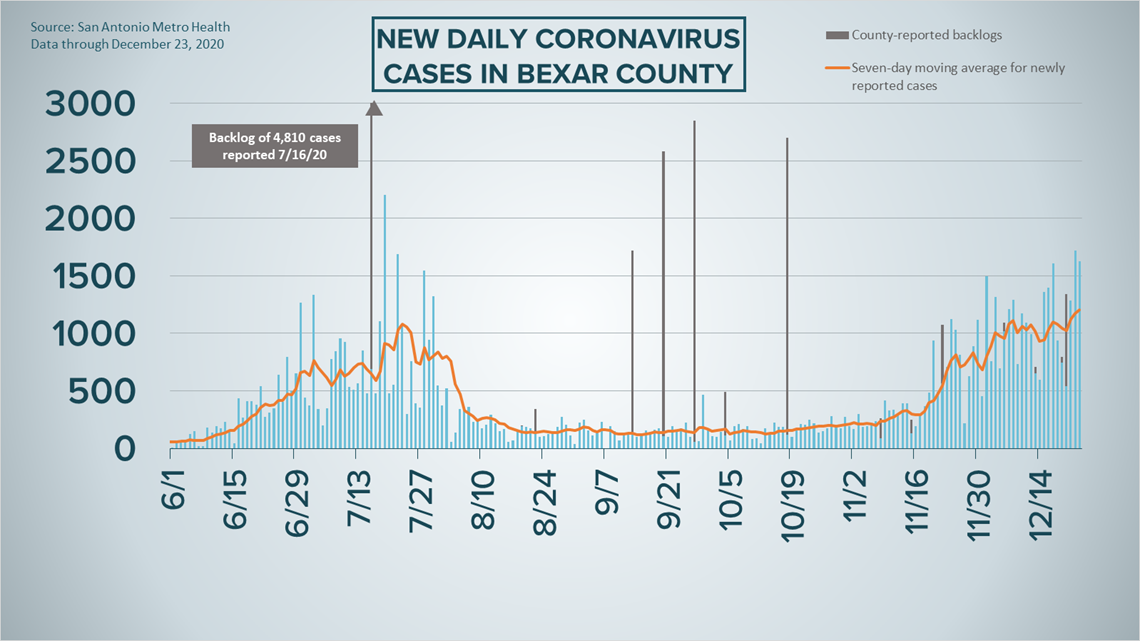
Hospitalizations also continue to rise in the San Antonio area, with 945 COVID-19 patients receiving treatment at local facilities on Wednesday. That's 33 more than on Tuesday.

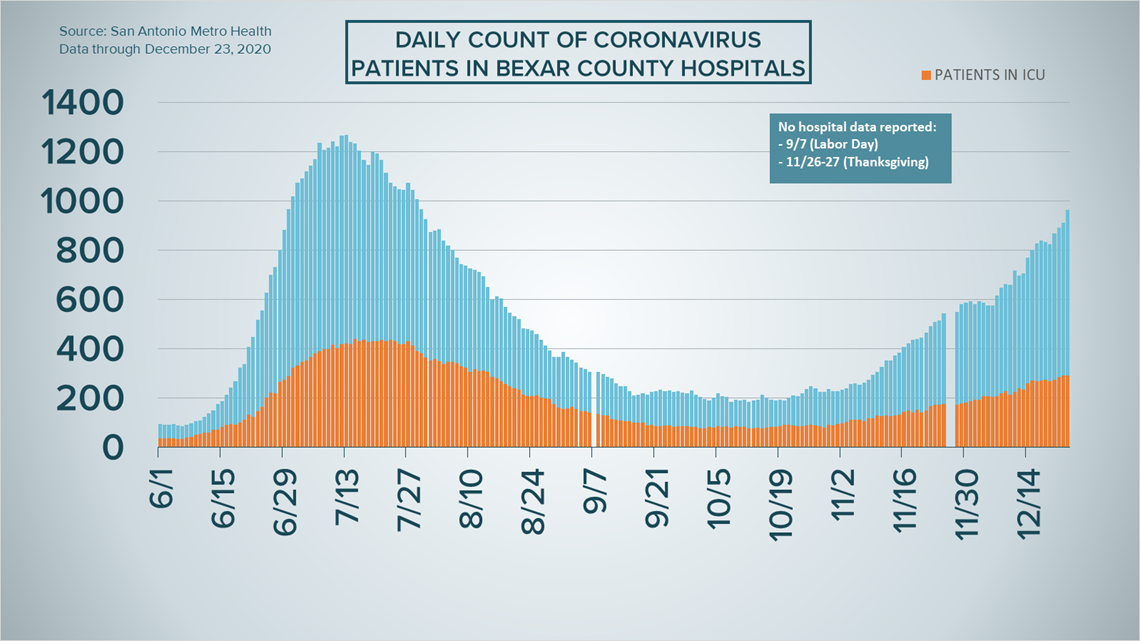
Coronavirus in Texas
The total number of novel coronavirus cases in the state since the pandemic began grew by 23,408 on Wednesday, according to the Texas Department of State Health Services. That total includes 19,185 new confirmed cases, 3,450 new probable cases, and 617 cases attributed to backlogs not previously reported in the state's total (more details can be found at the top of this page).

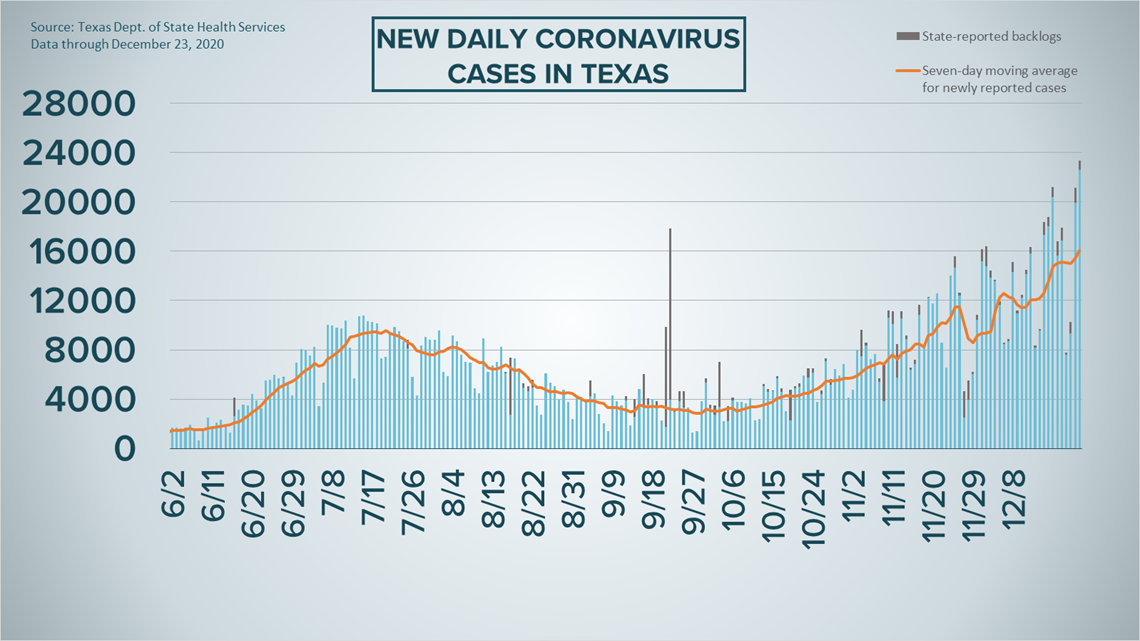
As of Wednesday, 1.595 million Texans have been diagnosed with COVID-19. The state's seven-day moving average for daily cases shot up to 16,051 as a result of the high case count.
State health authorities also reported 294 additional virus-related deaths on Wednesday. At least 25,900 Texans have died from COVID-19 complications. Meanwhile, the number of Texans receiving treatment at hospitals for coronavirus symptoms on Wednesday also rose drastically to 10,574, which amounts to a difference of 275 patients compared to Monday.
Meanwhile, the state estimates that 1.311 million Texans have recovered, while 283,588 Texans remain ill with COVID-19.
The latest update from the Texas Education Agency showed that there have been at least 90,164 cumulative cases among staff and students across the state through Dec. 13. That number comprises 57,137 positive student cases and 33,027 staff cases. More information can be found here.

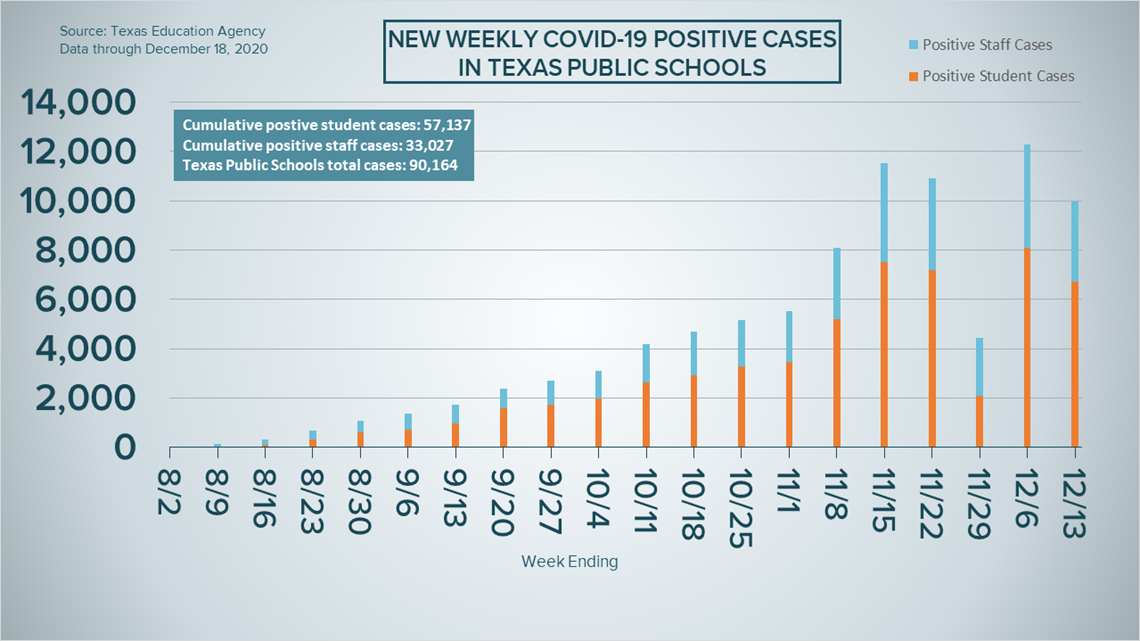
The TEA releases new data on school cases on Fridays.
Latest Coronavirus Headlines
Coronavirus symptoms
The symptoms of coronavirus can be similar to the flu or a bad cold. Symptoms include fever or chills, cough, shortness of breath or difficulty breathing, fatigue, muscle or body aches, headache, new loss of taste or smell sore throat, congestion or runny nose, nausea or vomiting, and diarrhea, according to the Centers for Disease Control.
Most healthy people will have mild symptoms. A study of more than 72,000 patients by the Centers for Disease Control in China showed 80 percent of the cases there were mild.
But infections can cause pneumonia, severe acute respiratory syndrome, kidney failure, and even death, according to the World Health Organization. Older people with underlying health conditions are most at risk.
But infections can cause pneumonia, severe acute respiratory syndrome, kidney failure, and even death, according to the World Health Organization. Older people with underlying health conditions are most at risk.
Experts determined there was consistent evidence these conditions increase a person's risk, regardless of age:
- Chronic kidney disease
- COPD (chronic obstructive pulmonary disease)
- Obesity (BMI of 30 or higher)
- Immunocompromised state (weakened immune system) from solid organ transplant
- Serious heart conditions, such as heart failure, coronary artery disease, or cardiomyopathies
- Sickle cell disease
- Type 2 diabetes
The CDC believes symptoms may appear anywhere from two to 14 days after being exposed.
Human coronaviruses are usually spread...
- Between people who are in close contact with one another (within about 6 feet).
- Through respiratory droplets produced when an infected person coughs, sneezes or talks. These droplets can land in the mouths or noses of people who are nearby or possibly be inhaled into the lungs.
- Some recent studies have suggested that COVID-19 may be spread by people who are not showing symptoms.
Help stop the spread of coronavirus
- Stay home when you are sick.
- Eat and sleep separately from your family members
- Use different utensils and dishes
- Cover your cough or sneeze with your arm, not your hand.
- If you use a tissue, throw it in the trash.
Find a Testing Location
City officials recommend getting a COVID-19 test if you experience fever or chills, cough, shortness of breath or difficulty breathing, fatigue, muscle or body aches, headache, new loss of taste or smell, sore throat, congestion or runny nose, nausea or vomiting, or diarrhea.
San Antonio operates several no-cost testing locations, including two walk-up locations open Monday-Sunday from 10 a.m. until 2 p.m.:
Cuellar Community Center
5626 San Fernando St.
San Antonio, TX 78237
Ramirez Community Center
1011 Gillette Blvd.
San Antonio, TX 78224
Additionally, Freeman Coliseum offers drive-through no-cost testing from Monday through Sunday between 9 a.m. and 4 p.m. An appointment is required and can be made either online or by calling (833) 213-0643.
Here's a Testing Sites Locator to help you find the testing location closest to you in San Antonio. And here are the dates and times that city-run testing sites will be operating over the holidays.

